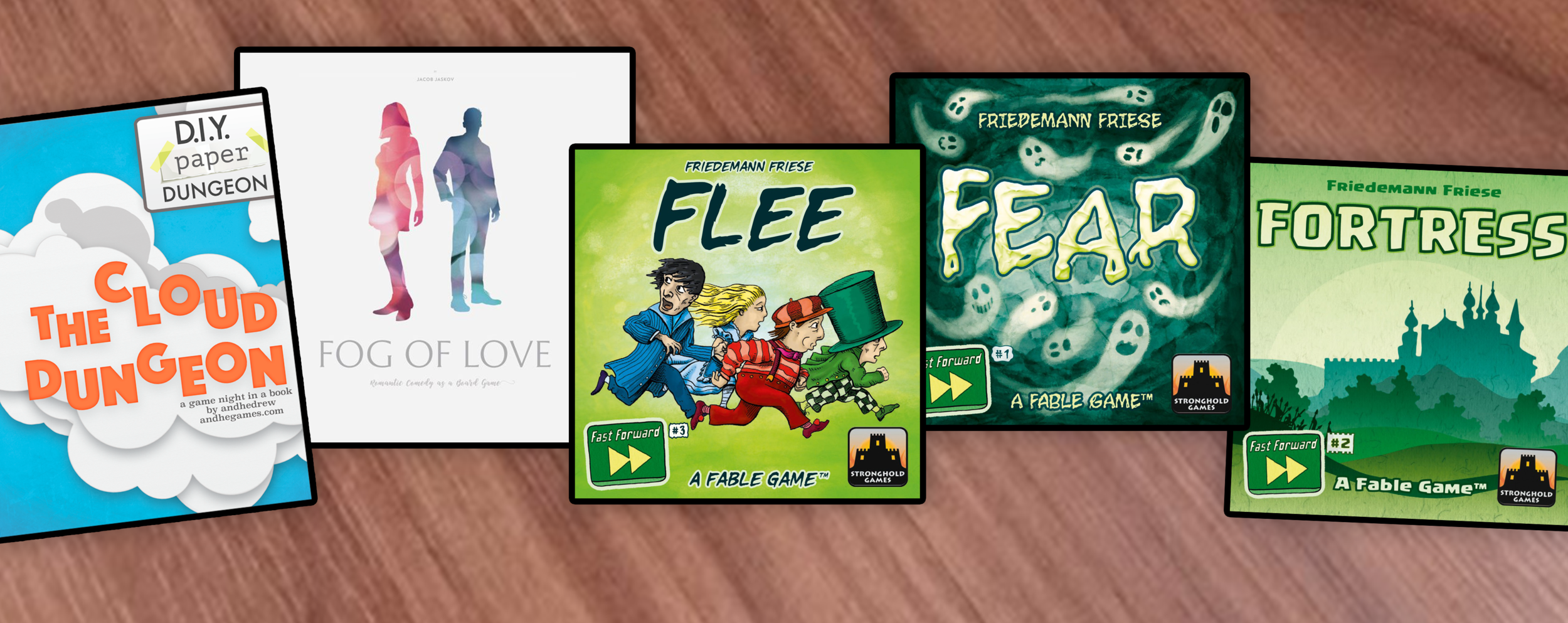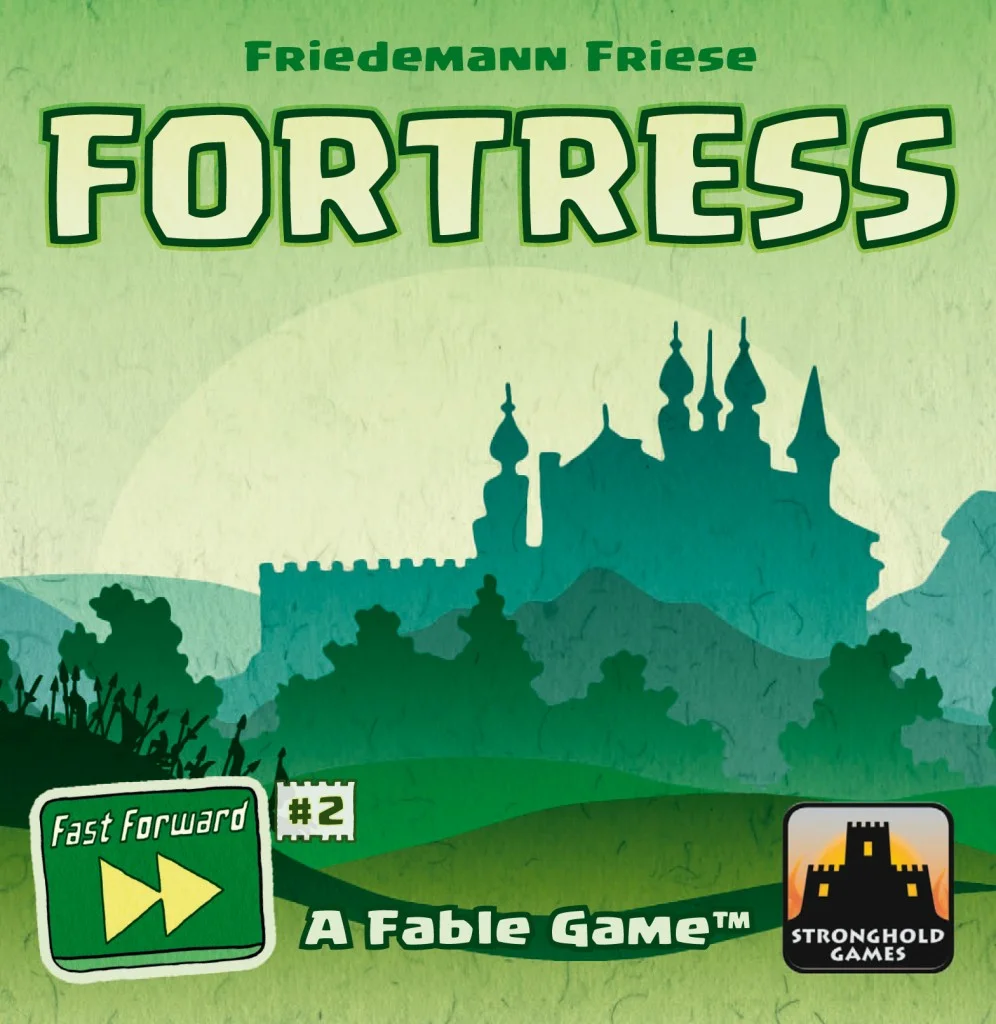Fast Forward: Fear
Designer: Friedemann Friese
Players: 3-5
Ages: 8+
Time: 15 minutes per hand, about 75-90 minutes when playing through the entire deck
Fear is the first entry in the Fast Forward series from Stronghold Games, where players learn the game as they play it for the first time. One of the key selling points is that the game has no rulebook. Instead players begin with a deck of cards with the starting rules on the first card. Players draw cards to begin playing the game; as they work their way through the deck, new rules cards surface so players learn the relevant section as they play.
On their turn, players each draw a card and play a card from their hand. The goal is to force other players to push the total value of the cards in play over 15, all without doing so themselves. The hands end when someone raises the value over 15, and the person who causes the pile of cards to exceed 15, but the person who has the highest value in their hand wins. Play changes as cards are removed from the deck and rules evolve as players dig deeper in and new cards are added to the mix.
The core mechanism is simple, with interesting decisions from both designers and players, all of which add both to the dynamic of gameplay and the sense of the discovery. Conflict is indirect; instead of simply attacking each other, players try to arrange things so that their opponents are forced into making the critical error that ends the hand. As players become familiar with both each other and the ever-evolving rules sets, the game gets more difficult: the same strategy rarely works twice, and any stunt you pull might well inspire an opponent in the next game.
Fear is perfect for just about any public facing collection. It’s a devilishly basic game that works well as an alternative to traditional games like Uno, Crazy 8s, Skip-Bo, and Spite & Malice. It works equally well for circulation or in-house collections.
Fast Forward: Fortress
Designer: Friedemann Friese
Players: 2-4, best with 4
Ages: 8+
Time: 15 minutes per hand, about 75-90 minutes when playing through the entire deck
Fortress, the second in the Fast Forward series, is a bluffing game. Unlike Fear, the first entry in the series, Fortress focuses on direct conflict as players try to conquer the titular fortresses using sets of monsters they gather to increase their combat strength. The number you play of a given type of monster increases their effectiveness when taking over or defending a fortress. Over multiple plays, the variety of monsters available change, and the number of fortresses expand, as do the rules pertaining to them.
Play starts with all the core rules on the front and back of a single card. New rules emerge from the deck over multiple rounds, called “hands.” Re-sorting the deck once players have completed all the rounds isn’t a hassle, but it also isn’t necessary. Once players have played through the whole deck, they can either re-sort the game and play through it from phase one, or shuffle all of the non-rules cards and play with all of the rules available from the start of the new game.
In all, Fortress is a perfect library game. It has enough depth to have interesting decisions for a wide range of game skills, while the conflict of attacking fortresses owned by other players will be exciting for kids raised on video games. Players who like traditional games like War, Old Maid, Battleship, Risk, or Stratego will find Fortress right up their alley.
Fast Forward: Flee
Designer: Friedemann Friese
Players: 2-4, best with 4
Ages: 12+
Time: 75-90 minutes
Flee is the third and (to date) final Fast Forward game. Like Fear and Fortress, Flee’s first cards instruct players on how to start the game, with new rules being revealed on other cards over the course of play. If you’ve been following our takes on this series, this should sound familiar, but don’t get too comfortable. Where the other Fast Forward games are competitive, Flee is a puzzle that players must cooperate to solve.
Because of its nature as a puzzle game, the deck can’t be shuffled and re-played from scratch as a complete game once players have made their way through. It’s basically one-and-done, but the end result is an engaging and highly structured Alice in Wonderland-themed game where players try to work through the deck, overcoming challenges without a game ending condition being inflicted on them--and by game ending condition, we mean “being eaten by monsters.”
Because Flee is cooperative, the cards players gather are played face-up where everyone can see them, becoming actions they can utilize and pass off or discard over the course of the game, with a certain amount of collective commentary and strategizing. Flee is a tense and exciting drama that that builds teamwork and critical thinking skills as players stave off inevitable defeat long enough to learn what they will need to do to get further on their next play through.
Flee, unlike Fear and Fortress, is not suitable for just any game collection. It stands out as a difficult problem to solve, making it appealing to fans of logic puzzles but less so to casual gamers. We liked Flee, and played multiple sessions of it, but never actually completed the game by making it through the deck and defeating the required number of monsters. It’s a good capstone to Fear and Fortress, but don’t expect heavy circulation if you stock it.
Article by Donald Dennis
Games in Schools and Libraries is produced in association with Inverse Genius and the Georgetown County Library System.
Games in Schools and Libraries Group on Facebook
Games in Schools and Libraries Guild at Board Game Geek
Email us: schoolsandlibraries@gmail.com




